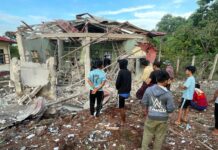By Kantarawaddy Times.
As the dry season approaches, IDP camps in western Dee Maw Hso Township, Karenni State are facing a water scarcity problem and currently having to borrow money to buy water, according to humanitarian workers who are helping IDPs.
A member of the Karenni State IDP Relief Team told to Kantarawaddy Times that with only a few camps located near streams and river, most IDP camps face severe water shortages.
“Some camps are situated as far as two or three miles from the nearest water source, while others are approximately a mile away. Consequently, it is arduous for many IDPs to fetch water. Most resort to purchasing water to alleviate the issue. Some even borrow money to do so. The communal water tanks are insufficient, and water donations are irregular. The donors cannot provide water tanks for every camp,” he explained.
Sources reveal that the sheer number of IDP camps poses a challenge for donors to provide water assistance to all IPD camps. Ko Pyi Sone, a member of the Pyikangkaw IDP Relief team stated that they can only donate to four camps per month due to financial constraints.
“Water is scarce. Fuel price increases have also hindered our donation efforts. Previously, we could donate water to several camps four times per month. However, with the proliferation of IDP camps, we’re striving to maintain our donations at that frequency. Despite the challenges, we’re doing our best to donate water approximately four times per month to as many camps as possible with the accessibility we have,” asserted Ko Pyi Sone.
Every IDP camp strives to maintain rainwater storage tanks for public use; however, the large population renders these tanks insufficient, according to IDPs.
IDP camps rely heavily on donations for drinking water, but they often have to resort to purchasing water with borrowed money due to insufficient donations. Rising fuel prices could exacerbate the situation in the long run, said an IDP woman.
“Donors provide water, but some camps have access to water sources within the village, allowing them to collect water and take a baht from there. For those IPDs where the water source is too distant from the camp, they are unable to fetch it and are forced to buy water. Prices have increased significantly than before. A 20-liter container used to cost 2000 kyats, but now it costs 3000/4000 kyats. I think this is likely due to the rise in fuel prices. Those residing far from water sources have no choice but to borrow money. It becomes a challenge for the long term,” accounted an IDP women.
The water shortage has led to health concerns among children. Children are experiencing health issues such as diarrhea and they have also been experiencing difficulty breathing due to dust inhalation, according to the IDP aid workers.
Approximately, there are 50 IDP camps housing 80,000 displaced people in the western part of Dee Maw Hso Township, said U Banyar, Joint Secretary 2 of the Karenni State Interim Executive Council (IEC).




